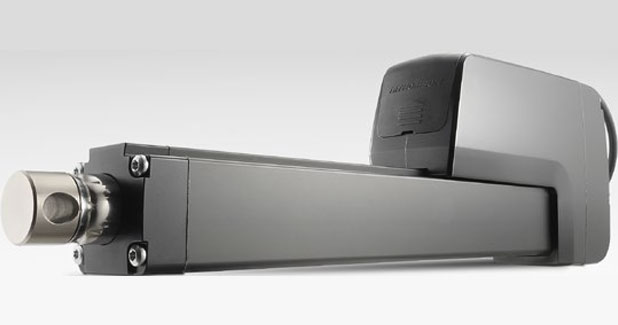
Linear Actuators with Synchronisation
<span style="font-weight: bold;">Embedded actuator synchronisation from Thomson offers new stability and efficiency for large and bulky load handling.</span><p></p><p> Thomson Industries, Inc, a leading manufacturer of mechanical motion control solutions, has announced the availability of new synchronisation capabilities for its Electrak®HD heavy-duty electromechanical linear actuators. Designers of equipment in which large or awkward loads must be moved repeatedly and evenly, such as large solar panels or heavy hoods on construction equipment, can now simultaneously distribute that load using up to four actuators.</p><p> Traditional methods for synchronising multiple actuators can be inflexible. Gas spring technology, for example, is limited in application, while hydraulic cylinders can be prone to leakage and costly to maintain. Non-integrated electronic systems have more flexibility and are cleaner but require external devices such as encoders and potentiometers to track position and send feedback to an external PLC or other logic solver.</p><p> 'The ability to synchronise movement of large and potentially awkward loads is something our customers have been requesting as they seek to automate larger applications or improve ergonomics,' said <span style="font-weight: bold;">Anders Karlsson, Product Line Specialist for Industrial Linear Actuators at Thomson</span>. 'We are pleased to announce that we have tapped into the advanced electronics capabilities of our popular Electrak HD heavy duty linear actuator technology to achieve synchronisation more easily and cost-effectively than is possible with any other available approach.'</p><p> Thomson achieves its synchronisation by embedding all load handling technology into a single electromechanical actuator, which is then wired in sequence with up to three other similarly equipped actuators. Designers install these wherever linear movement is needed without the need for external assemblies. Once the actuators are installed, customers synchronise them instantly by wiring them together and operating a single unit with a simple switch. During operation, system electronics detect speed changes that indicate load imbalances, thereby eliminating bouncing or other effects of imbalance. </p><p> By using multiple actuators, synchronisation increases system movement speed more efficiently. A larger load that might normally use a single, heavy load actuator, for example, could be moved faster by combining multiple, lower load actuators. Synchronisation also retains all Electrak HD mechanical capabilities, including the handling of bidirectional loads of up to 10 kN (2,250 lbf) with stroke lengths up to 1,000 mm (39 in) and accuracy of one per cent of stroke from 100-1,000 mm. High-quality ball screw assemblies provide efficient current draw and support speed options up to 43.5 mm/sec (1.7 in/sec) (using the 1.7 kN [382 lbf] version).</p><p> <span style="font-weight: bold;">Applications</span><br />There are numerous opportunities to apply the benefits of synchronisation. In addition to solar panels and off-highway agricultural equipment mentioned earlier, potential applications include:</p><ul><li>Industrial logistics trains for automatic correction of imbalances between the front and back end loads, which can cause stoppage, noise or unnecessary wear.</li><li>Doors on ovens and large processing equipment for smoother, safer opening and closing.</li><li>Ergonomic patient-handling equipment such as lift tables, synchronising operation of lift columns for smoother movement and higher-quality patient experience. </li><li>Marine applications, such as rudder assemblies, for smoother, more responsive steering.</li><li>Structural engineering applications such as automatic loading doors in factories and warehouses.</li></ul><br /><span style="font-weight: bold;"> Availability </span><br />Electrak HD linear actuators with synchronisation capability are available immediately (choose SYN in 'Electronic Options' after selecting an actuator part number). The same actuator can function as a master or slave in any multiple-unit configuration, simplifying replacement and reducing spares requirements.


 +91-22-24193000
+91-22-24193000 Subscriber@ASAPPinfoGlobal.com
Subscriber@ASAPPinfoGlobal.com